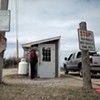Here's the problem: Most Vermonters support renewable energy, but when it comes down to individual proposals — be it for wind turbines, solar panels or biomass plants — these projects can be divisive, controversial and unpopular.
One solution, according to Andreas Wieg, of Berlin's German Cooperative and Raiffeisen Federation: energy cooperatives. Along with Belgian energy consultant Dirk Vansintjan, Wieg is barnstorming through Vermont this week on behalf of the Heinrich Boell Foundation, a nonprofit that promotes civil society and a healthy environment. The pair will be in Burlington tomorrow, April 27, for a forum called "Vermont's Energy Choices: Old Dirty Problems, Clean Energy Solutions."
Both European energy experts are promoting a grassroots, "bottom-up" approach to the so-called energy transition. Germany in particular has experienced meteoric growth in new cooperatives in recent years; roughly 650 new energy cooperatives have been founded in the last five years, encompassing about 100,000 members.
Wieg attributes the growth to a German law called the Renewable Energy Sources Act, which established a "feed-in tariff" system guaranteeing investors a set per-kilowatt-hour price for energy generation. (Vermont enacted a similar tariff in 2009.) Cooperatives allow residents — typically in rural areas in Germany — to band together and invest collectively in renewable energy projects.
This isn't to say that Germans wholeheartedly embrace renewable energy development. In a telephone interview, Wieg says that, just as in Vermont, Germany has experienced backlash against proposed turbines, solar panels and biomass plants. The problem of acceptance for renewable energy — "especially for wind turbines," Wieg says — "is a huge problem in Germany, and it is one of the key problems we must solve in the future."
But that, he says, is where cooperatives come into the picture: "If you involve people into a cooperative, and the cooperative is the owner, or the investor of the wind turbine, then the situation changes dramatically." Suddenly it's not a big, out-of-town investor backing a wind turbine; it's local investors, using financing from local banks, employing local workers, and reaping local returns.
Take a project in Bavaria. A local football club — that would be "soccer," for us Yanks — needed to put a roof over their stadium because of football association rules. But they couldn't afford the expense. So members of an energy cooperative invested in solar panels, and used the returns to pay for the roof. (And the investors reaped an additional return: season tickets.) Cooperative members, Wieg says, "want to do something sustainable, something in the region. They know in the long run it is better to have something like a regional energy supply and a regional energy demand that fit together."
Wieg, who has so far met with energy activists as well as lawmakers in the Upper Valley and Montpelier, says he occasionally hears the arguments that "people in Germany care more for each other, or they are more cooperative than the Americans" — an argument he dismisses as not true. The success of cooperatives in Germany, he says, has less to do with community goodwill than it does with good business and wise investing.
That said, he's reluctant to dole out any prescriptive advice for Vermont. "In Germany we are looking now for our way, for our path," says Wieg. "The energy transition is something like a trial and error process. You can't plan this process from a central viewpoint."
Catch Wieg and Vansintjan — as well as Sen. Bernie Sanders, and representatives from VPIRG, the Natural Resources Defense Council, and the Vermont Natural Resources Council — tomorrow at the Billings Auditorium at the University of Vermont.
File illustration Kim Scafuro
















































